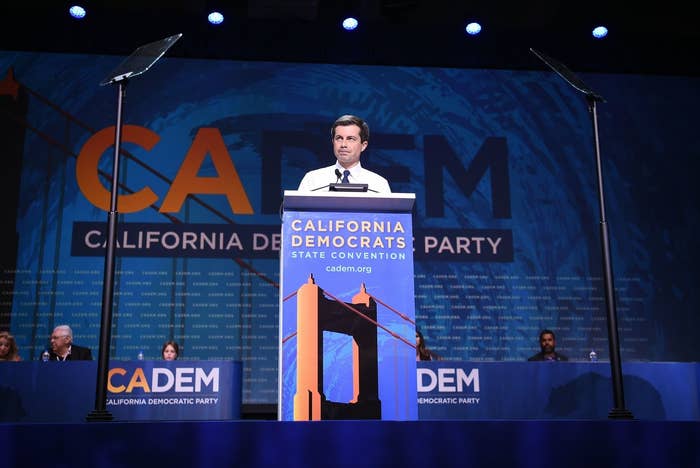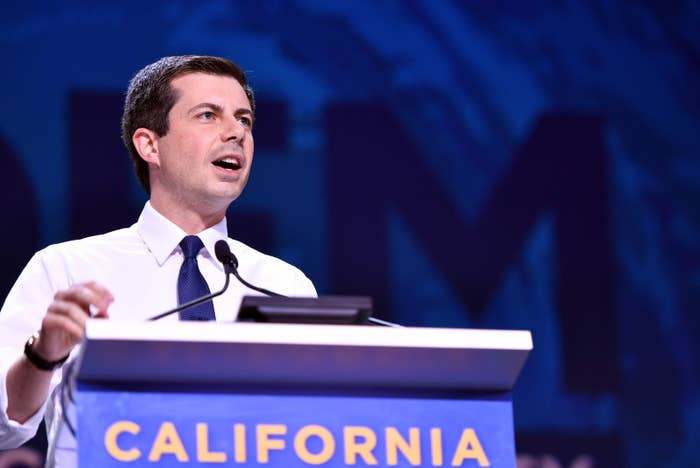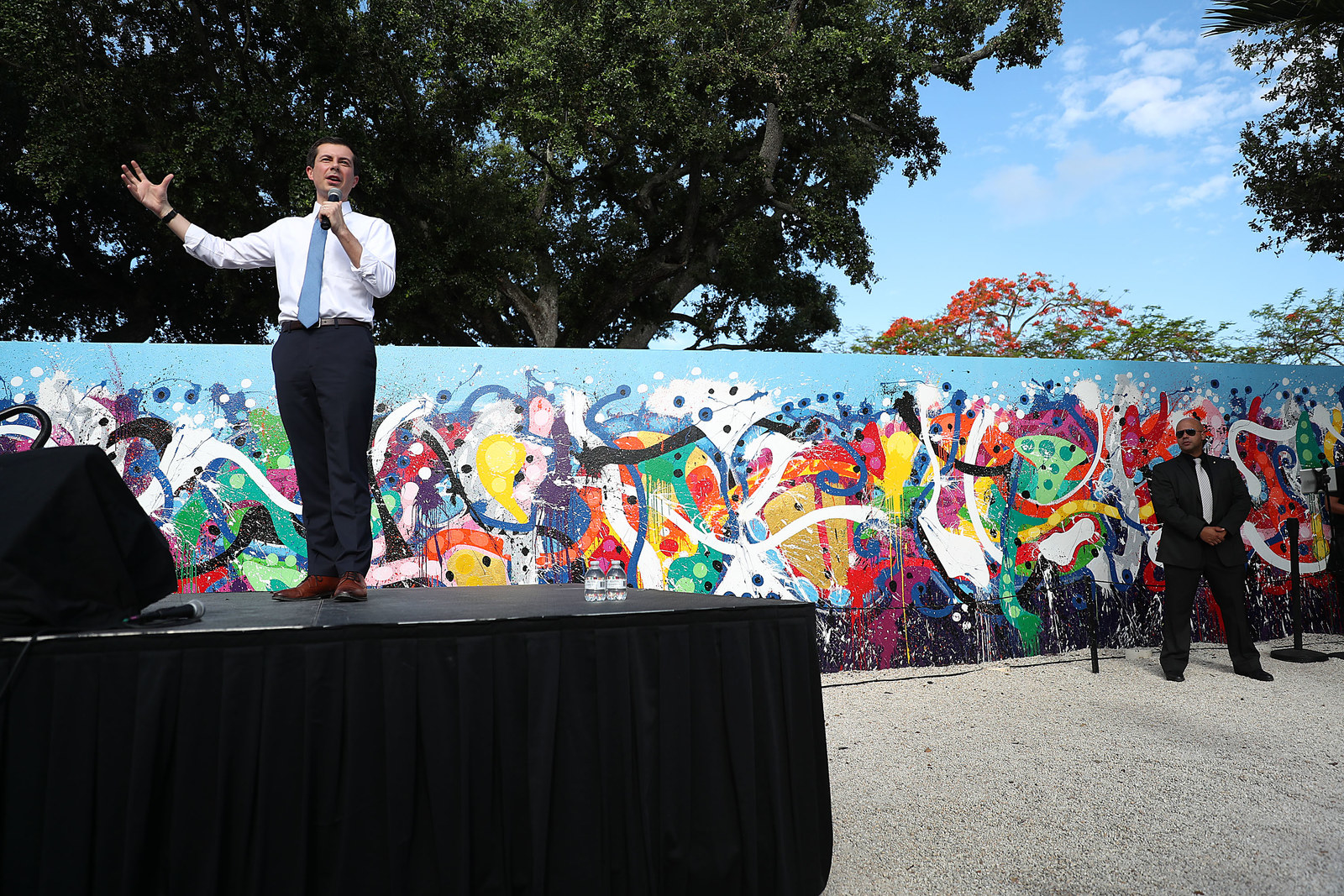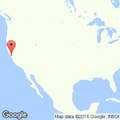
SAN FRANCISCO — California has so much of what Pete Buttigieg needs to be president.
There’s Hollywood, a perfect match for a progressive small-town mayor who comes out of nowhere to be a contender. There’s Silicon Valley, a comfortable fit for a millennial former business consultant who geeks out over data. And there’s a generous LGBT donor community eager to help the first gay candidate running a credible campaign for the White House.
There’s also a potentially big roadblock in a state poised to play a consequential role in the Democratic primary process: a large Latino electorate. Buttigieg’s struggles to connect with voters of color have represented a consistent weakness in his fast and surprising rise on the national scene. California Latinos are particularly skeptical. A Quinnipiac University poll from April measured support for Buttigieg at 7% among all Democrats in the state — good enough for a fourth-place tie with Sen. Elizabeth Warren — but only 2% among Hispanics.
Buttigieg had a chance to improve his standing here last weekend at the California Democratic Party’s convention, a diverse gathering where chants of ¡Si, se puede! — a callback to the “Yes, we can!” activism of Cesar Chavez and Dolores Huerta — broke out from time to time.
But the South Bend mayor’s public presence during a weekend packed with other presidential candidates was limited to two events: a union breakfast and his seven-minute speaking slot during the convention’s general session. He skipped a boisterous Chicano Latino Caucus meeting, where rivals Amy Klobuchar, Beto O’Rourke, and Bernie Sanders were warmly received. And his campaign, which has yet to fully staff up in California, lacked the robust sign-waving, hallway-coordinating organization shown by those candidates and others.
“I could tell you some things that I know about him, but I don’t know what he’s saying he’ll do as president,” said Miguel Cordova, a convention delegate who supported Sanders in 2016 but doesn’t yet have a 2020 favorite.
“I look at the white privilege part,” Cordova added, lamenting that Buttigieg has attracted more attention than Julián Castro, a Latino presidential candidate who was mayor of San Antonio before serving as Housing secretary in the Obama administration. “It’s so easy for some people to jump in the race and all the sudden be considered a top contender, while someone like Castro has been doing stuff and it’s like he’s not even polling as well [as Buttigieg].”
Buttigieg spokesperson Chris Meagher told BuzzFeed News the campaign is working to hire staff in California. As of Friday, the only employee based there was a West Coast finance operative.
“We’ll be back, and it won’t just be for fundraisers and late-night talk shows,” Meagher said. “We try to meet people where they’re at.”

Buttigieg has acknowledged his deficiencies with communities of color, especially with black voters. He and his supporters point to his landslide reelection victory as mayor of South Bend as proof that he has won over black and Latino voters in Indiana’s fourth-most-populous city.
“We’ve got to reach out in communities that haven’t had a chance to get to know me,” Buttigieg said Monday night during an MSNBC town hall forum from Fresno, California. “If you are neither already famous with a long track record in national politics, nor yourself from a community of color, then of course it’s going to take longer for people to come to know and trust you.”
Buttigieg advisers defended his outreach efforts by noting interviews he’s done with Spanish-language TV, like Telemundo and Univision. They also noted the Fresno swing, which included a meet-and-greet earlier Monday and followed his San Francisco visit, as proof of his efforts to speak to diverse audiences.
“I really appreciate him coming to the Central Valley, because even politicians in Sacramento won’t stop here in the Central Valley, and so it means a lot that he listens to the issues of the farmer and the immigrant,” Alex Garcia, the mayor of Wasco, California, told the Fresno Bee.
California’s primary, set for March 3, 2020, is expected to be more competitive than in past cycles, when the primary came later on the calendar and candidates typically only touched down in the state to raise money. Vote-by-mail will begin the same day as the Iowa caucuses, the traditional kickoff to primary season.
Buttigieg is focused on Iowa and the other early-voting states — New Hampshire, Nevada, and South Carolina — but California has emerged as part of his strategy to survive what could be a long and costly nominating process. During a visit to the state last month, Buttigieg rallied with Los Angeles Mayor Eric Garcetti and organized labor in between fundraisers, including a “grassroots” event aimed at smaller-dollar donors.
Fundraisers, including one at the National LGBTQ Center for the Arts, also dominated his recent Bay Area trip. While necessary to sustain an upstart campaign, it was a conspicuous choice. California Democrats talked excitedly over the weekend about how their earlier primary means that presidential candidates won’t be able to treat their state simply as a cash grab; they’ll have to spend considerable time mingling with average voters.
“That’s the true constituency for public officials — the funders,” Andy Hsia-Coron, a bemused convention delegate, said as he scoffed at Buttigieg’s packed fundraising schedule. “As they say, he who pays the bills calls the dances. You can’t expect anything different.”
Warren’s campaign seemed to wink at such activity in a fundraising email recapping her California travels, which included a huge Oakland rally. “Usually, when presidential candidates go to California, it's just for a spree of fancy private fundraisers,” the email read. “But Elizabeth doesn't do those.”
Buttigieg did make positive impressions with the convention attendees in San Francisco. Others, including homegrown candidates like Kamala Harris and Eric Swalwell, had more dedicated supporters on hand. But they lacked Buttigieg’s celebrity cachet. Hundreds of smartphones in camera mode raised as he took the stage for his speech to Panic! at the Disco’s “High Hopes.”
Buttigieg, whose multilingual talents are a well-known piece of trivia, delivered one line near the end of his speech in Spanish: Creemos que estos valores — no son valores conservadores, son valores Americanos. (“We believe that these values — they are not conservative values, they are American values.”) He otherwise gave a typical stump speech, without particular emphasis on Latino issues that aren’t ordinarily central to his theme of generational change and identity.
“This morning,” he said, teeing up a line that earned him his loudest cheers, “I woke up next to my husband in a marriage that exists by the grace of a single vote on the US Supreme Court.”
Buttigieg also presented himself as an alternative to septuagenarians like President Donald Trump and the leading Democrat in the race, former vice president Joe Biden.
“In these times, Democrats can no more keep a promise to take us back to the 2000s and the 1990s than conservatives can keep promises to take us back to the 1950s,” he said. “We can only look forward. If we want to defeat this president and lead the country in a new direction, we’ve got to be ready to transform our economy and our democracy into something new and better. Otherwise, take it from this Midwesterner, though he is deservedly unpopular, this president really could win again. … He wins if we look like more of the same. He wins if we look more like Washington. And so, the riskiest thing we can do is try too hard to play it safe.”
But Buttigieg left nagging doubts.

Hsia-Coron said he found the mayor “smart and eloquent,” but also too centrist and prefers Sanders. A small group of women who heard Buttigieg address the crowd during that morning’s Service Employees International Union breakfast at a nearby bar chatted approvingly about him afterward but expressed skepticism that he could place ahead of Biden, Sanders, and Harris, the state’s junior US senator, in the primary.
“You know, it’s not surprising, or necessarily a critique of him per se, being a mayor of a Midwest city,” Kevin de León, a Harris backer who lost a Senate bid last year, told BuzzFeed News. “But the time that he has doesn’t bode in his favor to establish any bona fides, let alone getting up to speed on the issues that Latinos care deeply about in California — not just getting up to speed, but articulating it and being able to connect with the voters with credibility so that they believe what you’re saying on issues that impact them on a very personal level.”
Alexandra Gallardo-Rooker, the California Democratic Party’s acting chair until elections at last weekend’s convention, believes Buttigieg can still connect with Latinos — if he tries harder.
“He needs to go out and speak to more of them, because he’s very articulate,” Gallardo-Rooker, a Latina, said in an interview. “He’s very smart. And I like that he’s very honest about stuff. He doesn’t beat around the bush. So I think he needs to come across to other communities.”
Gallardo-Rooker smiled as she recalled Buttigieg’s recent disapproval of those who boycott Chick-fil-A over its executives’ opposition to marriage equality.
“He said, 'great chicken, bad politics,'” she said. “He needs to communicate like that — very honestly — to the Latino community and others.”
Nidhi Prakash contributed reporting for this story.

